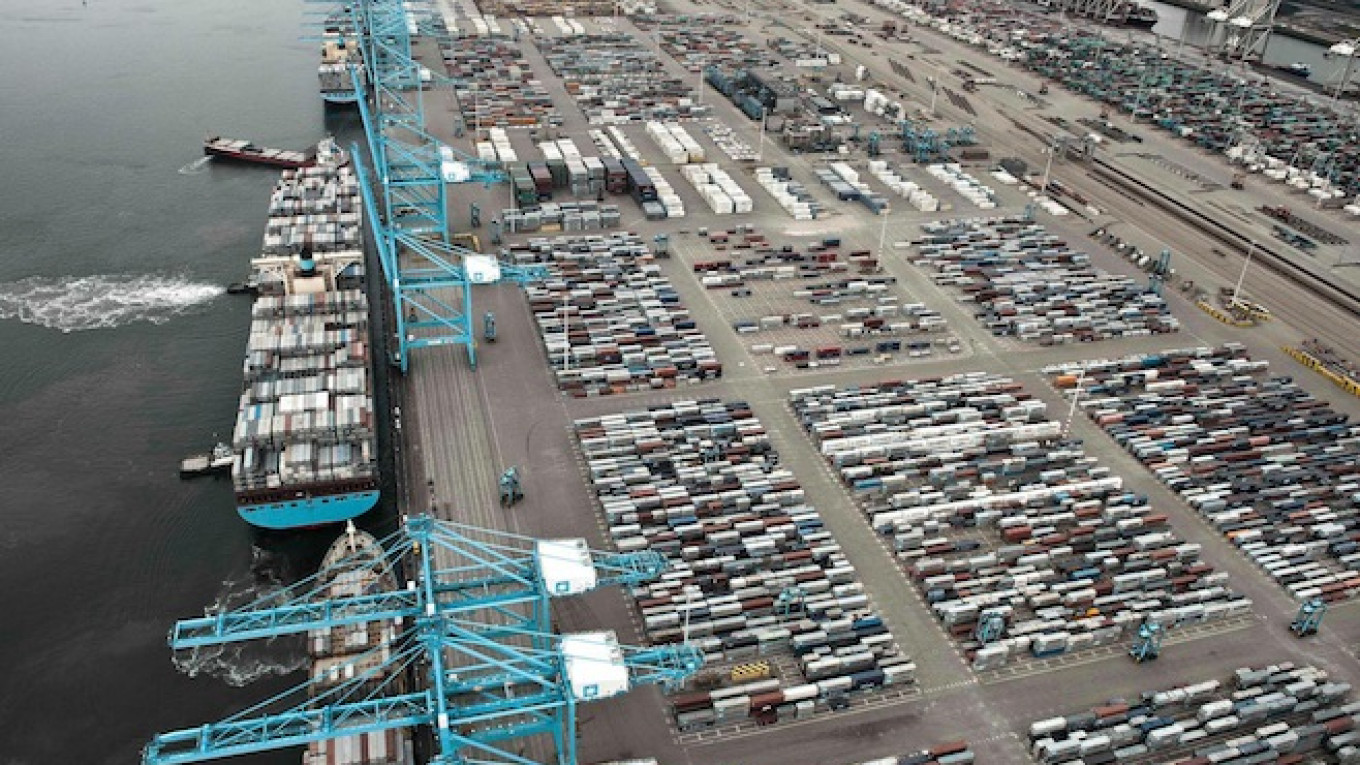Team Niinivirta, a Finnish family-run transportation firm, turned 60 this year, but its third-generation managers now don't know if the business will see Christmas, because of Russia's new ban on European food imports.
The firm based in Kotka, on the Gulf of Finland opposite St. Petersburg, was using its 12 refrigerated trucks to ship 80 loads a month of Finnish milk products to Russia.
But the ban on imports of dairy products, fruit, vegetables, meat, and fish from Europe has brought work for Niinivirta and similar specialist local truckers to a near standstill.
Meanwhile bigger more diverse logistics companies are expected to be able to adapt as substitute imports start to come from further afield, from countries unaffected by the ban.
"When I now look out the window, [eight of] the trucks stand idle in the parking lot," said Veikko Niinivirta, whose grandparents got their first truck in 1954 to transport timber. "I've been calling around, trying to find other uses for them."
"If I don't find anything we'll go bankrupt," he said. "Biting nails, we could survive two to three months."
For the European transport and logistics sector, which generates 900 billion euros ($1,200 billion) in annual revenue and employs over 7 million people, according to the Alliance for European Logistics, the food import ban hits the business of those companies already grappling with tight margins and overcapacity due to volatile freight costs and ailing European economies.
However, at the same time shipping companies like A.P. Moller-Maersk stand to benefit as Russia looks further afield to places like Brazil to help restock its larder.
EU farm exports to Russia are worth about 11 billion euros a year, roughly 10 percent of all EU agricultural sales.
"We have a big shipping route from Latin America directly into Saint Petersburg in Russia. There will be an upswing in [volumes on] long haul routes," Maersk's chief executive Nils Andersen said Tuesday.
"When there is less trade between Europe and Russia, more traffic turns up on the Asian side [of Russia], where we also have port activities at Vostochny."
Other companies that operate "reefers" — specialized refrigerated cargo ships that carry perishable goods — include Switzerland's Kuehne & Nagel, Germany's Hapag-Lloyd and Singapore's Neptune Orient Lines.
"That is a specialized market, and the demand/supply balance is probably more tight than in other shipping areas," said Lars Heindorff, an analyst with ABG Sundal Collier, noting that the refrigerated containers are more costly because the long distances and refrigeration require more energy.
Mixed Bag
Unlike local specialists like Team Niinivirta, many other companies in the sector, including Deutsche Post's DHL and France's Norbert Dentressangle, operate a range of businesses from trucking to freight forwarding to logistics, so may be able to make up for any lost trucking business with a boost to shipping or logistics.
"If new logistics solutions need to be found ... the logistics firms will benefit because it is their business to organize that," said Vontobel analyst Michael Foeth.
DHL and Kuehne & Nagel said they were monitoring the situation closely. Norbert Dentressangle and Britain's Stobart Group did not respond to requests for comment.
While Danish freight forwarding company DSV said it does not foresee a direct impact from the Russian ban on its business, it said the transport sector was seeing changes.
"There's a lot of transport equipment which is usually occupied transporting to and from Russia which is currently coming back to the European market," Director of DSV Investor Relations Flemming Ole Nielsen said.
"We can see an impact in overcapacity or at least more capacity being available," he said.
The manager of another Finnish trucking firm said idle trucks have already pushed down prices.
"Some offers seem very low, so low that I cannot fathom how they could be profitable," the manager said, declining to be identified by name.
The impact of the import ban is also being felt by non-food haulers traveling to Russia as drivers already nervous about driving there are now expecting more stringent customs checks including roadside stoppages, according to one UK-based transportation company.
"Some drivers are preferring not to work in Russia," said Luke Devlin, director of PDQ Specialist Couriers, which transports urgent goods. Managers are meeting this week, he said, to discuss options such as sending drivers in pairs.
See also:
Russian Food Watchdog Stops Imports of Banned EU Fruit Via Belarus
A Message from The Moscow Times:
Dear readers,
We are facing unprecedented challenges. Russia's Prosecutor General's Office has designated The Moscow Times as an "undesirable" organization, criminalizing our work and putting our staff at risk of prosecution. This follows our earlier unjust labeling as a "foreign agent."
These actions are direct attempts to silence independent journalism in Russia. The authorities claim our work "discredits the decisions of the Russian leadership." We see things differently: we strive to provide accurate, unbiased reporting on Russia.
We, the journalists of The Moscow Times, refuse to be silenced. But to continue our work, we need your help.
Your support, no matter how small, makes a world of difference. If you can, please support us monthly starting from just $2. It's quick to set up, and every contribution makes a significant impact.
By supporting The Moscow Times, you're defending open, independent journalism in the face of repression. Thank you for standing with us.
Remind me later.






